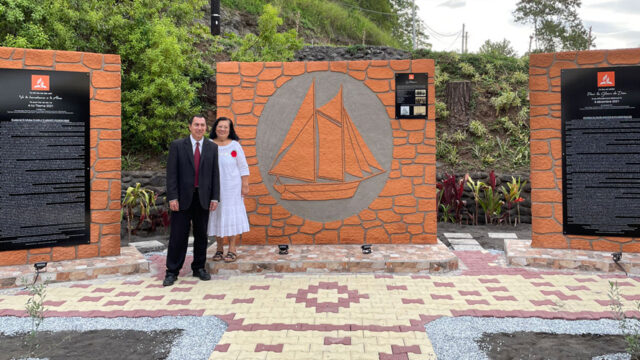Making Devotions a Priority

The night is divided into three watches on a sailing ship: first, middle, and morning. The middle watch is the most difficult. Everything is dark. The watch comes on duty at midnight and sees only the inky blackness of the waves, hiding a multitude of potential dangers. When the morning watch begins at 4:00 a.m., the darkness is as heavy as it was at midnight, but the morning watch sees the sky begin to brighten, the stars disappear, and the sun emerge from the sea. What had been hidden is now visible. Land emerges from the fog. Dangers that were unknowable in the darkness now menace. The morning watch sees the ship transformed from an inert construction of wood to a living home for sailors and passengers.
An Appropriate Metaphor
The image of the morning watch became a metaphor for the Christian’s personal time with God in the morning. The practice of the Morning Watch first came into focus in the life of Handley G. C. Moule, principal of Ridley Hall, an evangelical theological training school at Cambridge in England. Moule and Ridley Hall were part of an interdenominational movement that drew from many traditions in the English church.
Shortly after Moule became principal in 1880, Dwight L. Moody and Ira Sankey arrived in Cambridge. Moody had been reluctant to speak at the great centers of English education, since he had very little formal education. His simple heartfelt messages made a deep impact on a wide variety of students, however. The students at Ridley Hall, impressed by Moody’s ministry, soon noticed that Moule was up at 6:30 a.m., walking the
garden path of the school. When they asked, Moule told them he had discovered that he could pray best when walking.
Seeing him in communion with God, students began to ask themselves, “How can I lie in bed when that dear old saint is walking and praying in the garden?” As a result, the students formed a club and named it the Ridley Hall Morning Watch Union. They signed a declaration that read, “I will endeavour, God helping me, to set aside at least twenty minutes, and if possible one hour, in the early morning for prayer and Bible study, and also a short but uninterrupted time each evening before retiring to rest.” 1
Missionaries, Students, and Pathfinders
When John R. Mott, chair of the Student Volunteer Movement for Foreign Missions (SVM), visited Cambridge in June 1894, Moule recommended the Morning Watch to him. Following their conversation, Mott began to promote the keeping of the Morning Watch within the SVM. The SVM gained the attention of Seventh-day Adventists shortly after it was founded in 1886. Students at Battle Creek College formed a foreign missions group in 1890 and soon began a correspondence with Mott. In 1891 Frederick Rossiter, the leader of the Battle Creek group, attended the first international convention of the Student Volunteer Movement, held in Cleveland, Ohio, along with eight other Seventh-day Adventists associated with Battle Creek. Mott visited Union College and spoke at its chapel.
Milton E. Kern, a student at Union College, was sent as the delegate to the SVM Convention in 1898. With 1,600 attendees, the convention was one of the largest student conventions held up to that time. Kern heard Mott give an impressive address to the convention on the Morning Watch. In a later address Mott argued that “the source of the power of any spiritual movement is God, and the energies of God are released in answer to prayer.”2
Mott believed that missionaries would be empowered and sustained in the mission field as they established a firm relationship with God in direct communication with Him and in the reading of His word during the Morning Watch. However, the Morning Watch was for all Christians seeking to be effective for the cause of Christ. In its coverage of the 1898 SVM convention, the Review and Herald highlighted this address by giving a lengthy summary of it.3
Kern was a Union College faculty in 1907 when he became the first secretary of the General Conference Young People’s Department. On Kern’s insistence, it was officially renamed the Seventh-day Adventist Young People’s Society of Missionary Volunteers (YPMV). As head of the YPMV, Kern took an active role in promoting the Morning Watch.
The three purposes declared by the YPMV at its first convention in 1907—“to develop devotional life, missionary endeavor, and educational activities”—were like the emphasis Kern observed at the 1898 Student Volunteer Convention. Utilizing texts selected by YPMV corresponding secretary Matilda Erickson, Kern published a Morning Watch calendar for 1908 that included “a Bible text to read each morning, and encouragement to follow with meditation and prayer.” The Missionary Volunteer Law developed under Kern’s guidance became the Pathfinder Law that begins with the pledge “I will keep the Morning Watch.”
The Pathfinder Law, recited by countless Pathfinders over the past hundred years, begins with a promise to God to watch for Him and His work in their lives. Could it be that Pathfinders who make this promise central to their lives will flourish and their relationship with God will thrive?
Developing the Practice
How do you develop the practice of spending personal time with God? Over the years the following suggestions have been helpful to those who have succeeded in keeping the Morning Watch.
Make time with God a priority and observe it regardless of life circumstances. Moule was a very busy man, often called upon late at night. Nevertheless, he was up pacing the garden paths at 6:30 every morning. The students at Ridley Hall knew that his spiritual power came from those morning walks with God.
Morning makes a difference. In his 1898 address Mott gave some reasons one should meet God in the morning. That is when the mind is in its most receptive state. If we seek God later in the day, our minds are already preoccupied with other matters, and it is harder to focus on Him. If we seek God first, we are prepared for the day’s conflicts. We are not caught unprepared for spiritual battle. If we put it off, we may never get to it.
Watch for God. Don’t badger and berate yourself for your sins and shortcomings. If we discipline our minds to focus first on God’s mercy, grace, and power, these will permeate the rest of our time with Him. We then see our sins and shortcomings from the perspective of His grace and power. We confess our guilt and failures to Him, but then we receive forgiveness and new energy to follow His way.
Encounter God in His Word. Meditate on Scripture and allow His spirit to impress us with its meaning for our lives. We are then motivated to yield ourselves to Him in obedience. He comes near, and we sense His presence. Many have testified of the joy, peace, and sweetness of time spent with God. But these feelings are not the goal. They are merely the byproducts of our time with God.
As we spend time with God in His Word, our lives are enriched and filled so that the fullness of His grace overflows and impacts our world. We intercede for our loved ones, our neighbors, and our world. But that intercession is not formulaic, merely asking God to be with them and bless them. Rather, we seek to watch for where God is already working so that we can join Him in what He is doing in their lives.
Beware of Ritual
The Morning Watch can become just a ritual if we focus primarily on the study and analysis of information rather than on the transformation God can bring about. If the Morning Watch is a promise made, and more likely broken than kept, it can promote guilt. Perhaps it is better not to make the promise than to break it. On the other hand, the Morning Watch can be seen as God’s promise to meet with His children. To the extent that we respond to His invitation, we realize the incredible benefits of His presence in our lives. The Morning Watch thus becomes a time that the darkness of our night fades and the light of God shines upon our world. Dangers and opportunities are seen from the perspective of God’s Word, and we are prepared to meet the challenges of sailing through the day with Him.
1 John Battersby Harford and Frederick Charles MacDonald, Handley Carr Glyn Moule, Bishop of Durham: A Biography (London: Hodder and Stoughton, 1922), pp. 97, 101.
2 John R. Mott, “Prayer and the Missionary Enterprise,” in World-Wide Evangelization: The Urgent Business of the Church (New York: Student Volunteer Movement for Foreign Missions, 1902), p. 241.
3 John R. Mott, “The MorningWatch,” in The Student Missionary Appeal (New York: Student Volunteer Movement for Foreign Missions, 1898), pp. 233-239; W. E. Cornell, “The Volunteer Convention,” Review and Herald, Mar. 15, 1898, pp. 10, 11.








